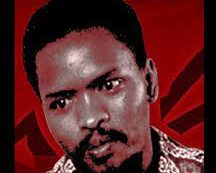President Cyril Ramaphosa is remembering Steve Biko in his weekly newsletter, writing that Biko’s legacy, of being the architect of one’s liberation is as important now as it was back then.
Dear Fellow South African,
On this day 45 years ago, Stephen Bantu Biko died in police custody in Pretoria Central Prison.
Human dignity, the principle at the heart of his black consciousness activism, was denied him. In the words of the family lawyer Sir Sydney Kentridge, his was “a miserable and lonely death on a mat on a stone floor in a prison cell”.
It remains a source of great sorrow all these years later to recall that Steve Biko was just 30 years old when he died. He was cut down in his prime by those who feared the power and resonance of his ideas of self-liberation and his efforts to infuse black men and women with pride and dignity.
He never got to see what he called ‘the glittering prize’ in his lifetime, the realisation of true humanity.
Writing about this ideal, he famously said: “In time we shall be in a position to bestow upon South Africa the greatest gift possible – a more human face.”
When we won our freedom in 1994, we understood that the right to vote was just one part of our struggle for human dignity.
Twenty-eight years into our democracy, we are confronted with many challenges, such as poverty, unemployment and inequality. As a result, we often lose sight of how far we have come in giving effect to the principles on which our Constitution is founded and that anchored Steve Biko’s thoughts and teachings.
In 1977 a heartless regime killed one of our country’s most promising leaders by depriving him of the food, water and medical treatment he urgently needed as a result of brutal beatings by the apartheid police.
Twenty years later, in a 1997 judgment, the Constitutional Court said that fulfilling the fundamental rights of every citizen and striving to achieve their socio-economic rights is the hallmark of a democratic society aiming to salvage lost dignity.
In South Africa today, we continue to work to fulfil the basic rights of every South African so that they may lead quality lives free of disease, hunger and deprivation.
Successive democratic administrations have implemented policies to salvage the lost dignity of this country’s majority by providing education, health care, housing and basic services.
In South Africa today, a decent education is a fundamental right. The state invests in early childhood development, supporting learning outcomes for our youngest citizens, and provides social relief through school feeding programmes to ensure young learners achieve the best outcomes possible.
Through the National Student Financial Aid Scheme and various other forms of state support, thousands of young South Africans from poor backgrounds have been able to become doctors, lawyers, teachers, scientists, artisans and entrepreneurs.
The government supports poor and vulnerable citizens through an extensive social safety net and provides work opportunities through mass public employment programmes.
In the repressive South Africa in which Steve Biko died, freedom of speech was curtailed and political activism attracted detention or worse.
In South Africa today, young people of the same age as Steve Biko and even younger are at the forefront of activism for causes closest to them, and they can organise free of harassment or banishment. Freedom of speech and association, the right to protest and the right to equality before the law is upheld for all.
As a country, we have come a long way towards the fulfilment of human dignity, the principle that Steve Biko so cherished. Yet, we still have so much further to go.
Without a job, without a house, electricity or running water, without land, without skills or opportunities, millions of South Africans are still deprived of the lives they seek and deserve. That is why the government is working with social partners to build an inclusive economy, create employment, enable businesses to thrive and tackle poverty and hunger.
In considering the relevance of Steve Biko’s life and legacy, we recall his powerful call to the people to be architects of their liberation. This call is as important now as it was back then.
We must be focused on addressing our challenges to achieve a truly free and equal society. We each need to play our part by using the foundational rights in our Constitution to build a South Africa free of poverty and hunger, underdevelopment, crime and violence.
As Steve Biko urged, let us march forth with courage and determination on our common quest for true humanity.
With best regards,
Cyril Ramaphosa


